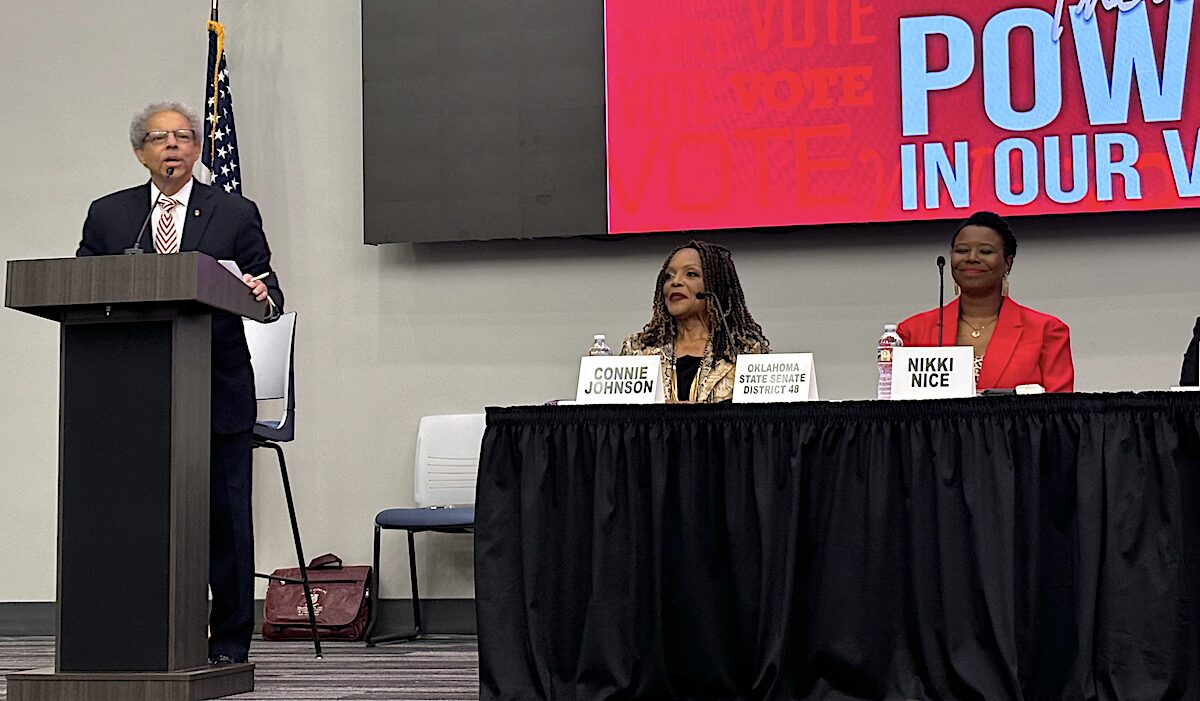
While both candidates are familiar faces to voters in Senate District 48, former State Sen. Connie Johnson believes she has the legislative experience and know-how to hit the ground running if elected to Senate District 48. Meanwhile, OKC City Councilwoman Nikki Nice believes it is time for fresh ideas and a senator who can serve the full 12 years allowed by Oklahoma’s term limits.
Those are the battle lines being drawn ahead of the June 18 winner-takes-all Democratic primary election for the Oklahoma City-area Senate seat.
With no Republican or independent candidates filing, whoever wins the primary will fulfill the remaining two years of a term being vacated by Sen. George Young (D-OKC). Young, who also works as a pastor at Mount Carmel Baptist Church, announced his decision to step aside in February. He represented residents in northeast OKC since 2014, first in the House of Representatives before being elected to the Senate in 2018. Young has endorsed Nice to be his successor.
Nice has served on the OKC City Council since 2018, and she was reelected in 2021. Johnson served District 48 in the State Senate from 2005 to 2014 before running unsuccessfully for U.S. Senate and then governor over multiple election cycles.
The subject of how long Johnson can serve if elected this year has been one of the few controversial points in the race. Legislators in Oklahoma are limited to 12 years in the House and Senate before term limits prevent future reelection efforts, but partial terms in office are not counted toward that total. As a result, Johnson said she has six full years that she could serve if elected, including the remaining two years of Young’s term. When Johnson was first elected in 2005, it was to finish the remaining year on another legislator’s term.
“I can serve the remainder of Young’s term for two years, and then I can run for another four-year term,” Johnson told NonDoc. “There has been a lot of misinformation put out there about that.”
In Nice’s view, that’s still not enough time to effect change she believes is needed to make the district a better place.
“My opponent, she has been there, and I am grateful for the work that she has done,” Nice told NonDoc. “But it’s time for some fresh leadership. We need someone who can have longevity for our community and be in that seat for 12 years.”
Johnson said she decided to run for Senate District 48 again because of unfinished business and because she believes she has the experience needed.
RELATED
Attorney, former OKCPS Board member seek Democratic nomination for Senate District 46 by Faithanna Olsson
“I have the experience, the knowledge and the success rate having served in that position,” Johnson said. “It inspired me to return and finish the work I started when I left. Many of those issues are still front and center. I worked to achieve change on criminal justice reform, decriminalizing simple possession of drugs and expanding Medicaid. Those issues are still very important, and this is a time when we need experienced and knowledgable people.”
While Nice’s work on the OKC City Council has been on the municipal level, she believes she is ready to take the next step by running for a job with a wider scope.
“With Sen. Young stepping down and retiring, I think this was the time to do it,” Nice said. “I want to serve on a higher level. All politics is local, and being able to work under a nonpartisan umbrella of leadership, even though sometimes it can be partisan, has helped me learn how to work with people who have different views than I do. I think it is a chance to be impactful and another way to serve the place that I’ve lived my entire life, but also the rest of the state.”
A strong Democratic seat, Senate District 48 includes much of northeast OKC and Spencer, but it also extends north and west to the intersection of May Avenue and Memorial Road. It includes both urban and rural areas.
SD 48 issues: over-criminalization and lack of opportunity

Nice has worked to bring grocery stores to northeast OKC, but in her view the district still has many needs that are not always being addressed at the state level.
“I think that when we look at the things we’ve been able to tackle, things like food insecurity and access to quality education for the community and our senior wellness center, there is still a lot to be done,” Nice said. “We need to bring better quality jobs to the district and continue to work on criminal justice reform. There are so many layers that impact our community, but they all connect and intersect. One of the biggest things is how do we collectively stir movement on those issues.”
Johnson said many of the things she started working on early in her legislative career still need to be addressed today. Oklahoma still ranks high in incarceration, for example.
“I think one of the biggest (things) when I ran in 2005 was the issue of grandparents raising children,” Johnson said. “Oklahoma is one or two in that mostly for people who are incarcerated for nonviolent crimes to fulfill private-prison bed guarantees. That was a problem then and things have changed a little since we legalized medical cannabis but we’re still seeing people serving life without parole. And in the post-COVID world, mental health is front and center, but we continue to criminalize people with mental health problems. That’s unacceptable to me. In my district, you still see over-criminalization of people leading to families being torn apart. Our systems are broken.”
Working with the majority party
It’s no secret Oklahoma’s Legislature is dominated by Republicans, putting Democrats solidly in the State Senate minority and making it difficult to push policy proposals forward for consideration.
Still, both SD 48 candidates believe they can work within those constraints. Johnson already has. And while the OKC City Council is technically nonpartisan, there are conservative voices in contrast to Nice’s more liberal positions.
Johnson said she has been able to find common ground with conservative Republicans on some issues. Perhaps most memorably, she authored Senate Bill 464 in 2007 with future Republican Party Chairman and then-Sen. Randy Brogdon (R-Owasso) to prohibit Oklahoma from complying with federal REAL ID requirements. The bill was authored in the House by three staunch conservatives — Rep. Charles Key (R-OKC), Rep. Randy Terrill (R-Moore) and Rep. Sally Kern (R-OKC) — as well as Rep. Darrell Gilbert (D-Tulsa). The bill passed unanimously in both chambers, but the state has now implemented REAL ID more than a decade later.
“I have always believed that education is the key to understanding,” Johnson said. “With term limits, we have lost a lot of institutional knowledge among legislators. But I’m unique in that I was there, and I know the issues. Sometimes education worked, and sometimes it didn’t, but what I found is that we have things in common. The death penalty is an example of that. I have worked with conservatives on that issue. I think in the end it’s the relationships that matter most.”
Nice said she is realistic about what it will be like to work with people in the opposing party who don’t share her priorities, but she believes some issues can transcend simple red-and-blue politics.
“I don’t think it’s going to be easy to get things done, but we all have issues that are important to the communities we serve, and I think having been in local politics will help me connect with other people who come from the same background,” Nice said. “There are a lot of rural areas that I currently serve, and they have many of the same values and problems that other rural areas around the state have. I think that’s an example of how common ground can be found.”






















